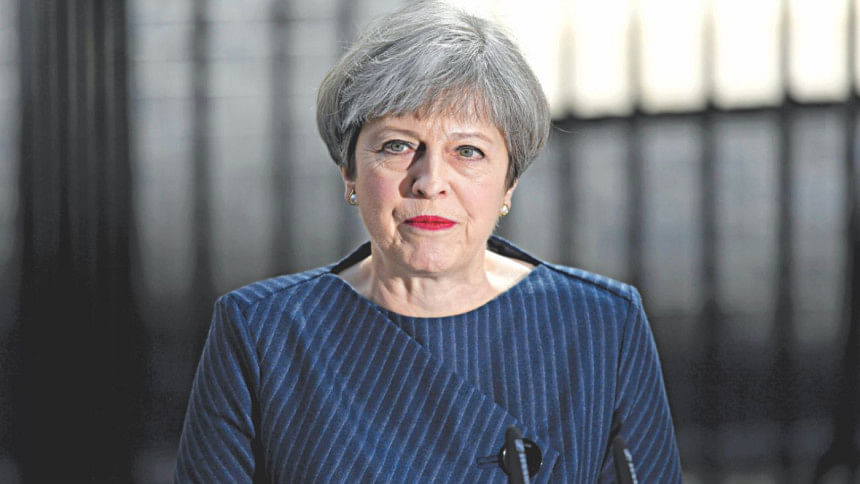May on the rocks as foreign, Brexit ministers quit

British Prime Minister Theresa May's government imploded today as Foreign Secretary Boris Johnson followed Brexit minister David Davis in resigning over her masterplan for Britain's future outside the EU.
Davis and his deputy dramatically quit overnight over May's plan to retain strong economic ties with the European Union even after Britain leaves in March next year.
Brexit cheerleader Johnson then delivered a stunning second blow when he also marched out, triggering speculation that May could face an imminent leadership contest.
May paid tribute to her outgoing foreign and Brexit ministers today but told parliament she and they "do not agree" on the best way forward in the negotiations.
"We do not agree about the best way of delivering our shared commitment to honouring the result of the (2016) referendum," May said after the departure of Foreign Secretary Boris Johnson and Brexit Minister David Davis put her government on the line.
May's Brexit plan -- agreed by the cabinet on Friday in the hope of unblocking negotiations with Brussels due to resume on Monday -- has now cost her two of her top four ministers, throwing her administration and authority into turmoil.
"This afternoon, the prime minister accepted the resignation of Boris Johnson as foreign secretary," her Downing Street office said in a three-sentence statement.
"His replacement will be announced shortly. The prime minister thanks Boris for his work."
Johnson criticised the Brexit blueprint in private but has so far refrained from public comment.
Downing Street swiftly appointed eurosceptic housing minister Dominic Raab to Davis's job, and said May was looking forward to working with him to deliver Britain's departure from the EU in March.
The resignation of Davis, with a stinging warning that Britain was "giving too much away too easily" in Brexit talks, was a blow to May just days after she declared a truce among her warring ministers.
Next move
All eyes are now on the next move by Brexit hardliners in her centre-right Conservative Party.
But the appointment of Raab, a leading Brexit supporter, suggests Tory Brexiteers are divided.
Davis himself said it would be "wrong" if his departure led to a full-fledged rebellion, insisting that "of course" May would survive.
May will address parliament later to explain her proposal for Britain to adopt EU rules on goods after Brexit, and is also expected to speak to Conservative MPs.
The plan was agreed by cabinet ministers during marathon talks on Friday, where even those wanting a clean break from the EU fell into line.
The deal meant that for the first time since the vote for Brexit in June 2016, Britain has a detailed proposal to take to Brussels, and still hopes to agree a deal by October.
May's spokesman told reporters: "There was an agreement reached on Friday and we look forward to taking that agreement forward in negotiations."
He added: "We believe it will deliver a positive Brexit, that's what we're focused on."
European Commission spokesman Margaritis Schinas said the change of ministers was not a problem and that the EU was ready to negotiate "24/7".
The EU "will continue to negotiate in goodwill, bona fide, with Prime Minister May and the UK negotiators in order to reach a deal", he said.
May spoke to Commission chief Jean-Claude Juncker, EU president Donald Tusk and the leaders of Ireland, Sweden and Malta over the weekend to discuss her plans, and is meeting Austrian Chancellor Sebastian Kurz in London later Monday.
'Reluctant conscript'
In his resignation letter to May late Sunday, Davis warned that on Brexit, "the general direction of policy will leave us in at best a weak negotiating position, and possibly an inescapable one".
Her plan would "make the supposed control by parliament illusory rather than real", and proposals for a "common rulebook" on goods "hands control of large swathes of our economy to the EU".
Davis said his job required "an enthusiastic believer in your approach, and not merely a reluctant conscript".
Speaking to BBC radio on Monday, he said he hoped Britain would "resist very strongly any attempt to get any further concessions".
May replied in a letter rejecting "your characterisation of the policy we agreed", which she said would see powers currently held by the EU returned to Britain.
Davis was appointed after the referendum to head up the newly created Department for Exiting the EU and became the public face of Brexit, leading the British delegation in talks with Brussels.
His role had been increasingly overshadowed in recent months as May and her aides took a bigger role, and had reportedly threatened to quit several times as they moved towards closer ties with the EU post-Brexit.
Brexit hardliners have welcomed Davis's move, with Conservative MP Peter Bone saying: "The PM's proposals for a Brexit in name only are not acceptable."
The main opposition Labour Party said the government was in "absolute chaos".
"It is now clearer than ever that Theresa May does not have the authority to negotiate for Britain or deliver a Brexit deal that protects jobs and the economy," spokesman Keir Starmer said.

 For all latest news, follow The Daily Star's Google News channel.
For all latest news, follow The Daily Star's Google News channel. 




Comments